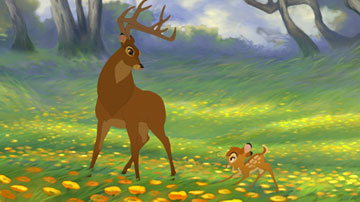The quintessential Disney depiction of the baby deer, with human emotions and high ideals allows us to be entertained and we quickly identify Bambi as the protagonist. How can this possibly be bad?

This may be stating the obvious, but deer don’t talk to each other and do not have feelings and emotions in the same way that we do. They are wild animals. Sadly a majority of people anthropomorphise animals. Lions are given names as if they were something straight out of “The Lion King”. Scores of tourists have been killed because they think that the animals they’ve seen in zoos and in disingenuous documentaries where animals are bestowed human characteristics, are the same animals in the bush. They climb out of their cars to take photo’s and are subsequently mauled.
The main problem with this sentimental approach is that many so-called environmental NPOs take full advantage of this to rake in money for “the cause”. Some charities spend a full 94% on administration and fundraising and 6% on charitable activities. ( charitywatch.org )
Real Conservation, also known as Scientific Conservation, doesn’t erode the feelings that people have for animals. However, it takes a constructive realistic view of conservation. It’s easy, but incorrect, to say that elephants are under pressure across the continent of Africa. It’s true that in Kenya (a perfect example of “things fall apart”) elephants are being poached at an alarming rate. However in Zimbabwe’s Hwange National Park, the situation is the polar opposite. The park has a carrying capacity of 30 000 elephants. The current population is approaching 50 000. This is a huge problem as the possible solutions (relocation, birth control) have been tried and although they’ve enjoyed limited success, they are prohibitively expensive and have not solved the problem.
So the sole, workable solution list is reduced to two options. Both are unpalatable and especially odious to armchair environmentalists and most (but not all) hunters.
Firstly, the culling of the entire herd is necessary. I have spoken to professional hunters who have been asked to do this, and it is the singular most unpleasant thing they have ever had to do. With elephants, sadly, you cannot just cull the matriarch or breeding males or females. The entire herd will then become “rogue” and actively hunt humans. Thus, the horrifying practice of culling entire herds. This hopefully prevents the situation where the community takes matters into it’s own hands, as it did a few years ago when 300 elephants were poisoned.
The second option is more palatable and has added side effects. This is allowing trophy hunting to take place. This involves the recruitment of wealthy overseas hunters who, for their own reasons, want to pay enormous amounts of money for the act of killing an elephant or even two.
As has been said before by others, this then turns into an entire industry of taxidermists, professional hunters, skinners, scouts, trackers and supplements an entire section of the community who have a protein deficient diet. In addition to this, a sizeable portion goes into conservation, anti-poaching and research. The community will not be tempted to bite the hand the feeds it and the animals are carefully selected as rogues males or similar, who will have no impact on a herd.
Armchair conservationists are, understandably, upset by photographs of dead elephants with grinning wealthy hunters in the background. However to reinforce the point, this is the most effective way of conserving and managing wildlife.
So in conclusion, before tarring and feathering trophy hunters, no matter how unpleasant the practice is seen from a disney-esque point of view, it is currently the best tool we have to manage wildlife and to manage conservation. I can guarantee, that if trophy (and meat) hunting was re-introduced to Kenya, the herds would recover within 20 years.
If you love animals and want a future for wildlife in nature, do the science, do the research and become a true conservationist.
